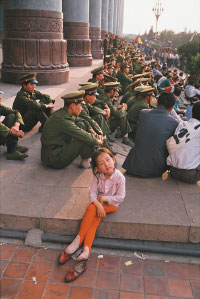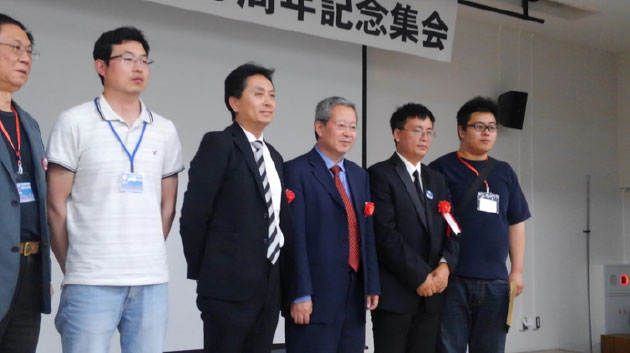Activists Pull the Reins on Japan’s Appeasement China Policy at Tiananmen Memorial Gathering
Key points in this article:
- The “June 4 Tiananmen Square Massacre Memorial Gathering” was held in Tokyo.
- Economist Xia Yeliang and political science critic Genki Fujii criticize Japan’s appeasement China policy.
- Japanese politicians should support China’s democratization.
On June 4th, 1989 the students who had continued their non-violent resistance to the Beijing government were ruthlessly massacred in Tiananmen Square. It has been 30 years since. On May 31st the “June 4 Tiananmen Square Massacre Memorial Gathering” was held in Tokyo, Japan.
On the panel were Feng Congde (one of the student leaders at the Tiananmen Square Protests and now resides in San Francisco as the executive director of Tiananmen University of Democracy), Xia Yeliang (former Peking University professor and co-author of the Charter 08 manifesto alongside Liu Xiaobo, now residing in the U.S.) and Genki Fujii (a Japanese political science critic).
The Gathering began with everyone paying their respects to those who lost their lives at Tiananmen Square during that fateful incident.
Xia Yeliang Slams Japan’s Appeasement Policy
The first to speak was Xia Yeliang on the topic “The current state of China’s economy and the possibilities for democratization.” He stated his conviction that the U.S. will win the trade war. China’s real estate and financial markets are showing a major slowdown in China’s economy, and an attempt to retaliate would mean destruction.
China has a new card up their sleeves: to cut off exports of rare earth minerals. Yeliang explained that this is not a problem since there are other sources of rare earth materials.
Yeliang also warned that as China’s continues their clash with the U.S., they are simultaneously attempting to improve relations with Japan to compensate for their losses in U.S. trade. The Japanese government must realize what China is trying to do.
There are increasing risks of bad debts in depositing money at Chinese banks, at there is a high possibility of a financial crisis like the one in 2008. There is a chance that this will fuel democracy activism in China, Yeliang said.
Feng Congde: The CCP Suppressed A Non-Violent Demand For Democracy
Feng Congde’s talk was entitled “The 30th anniversary of the Tiananmen Square Massacre: what we can do now.” Feng was one of the last students standing in Tiananmen Square demanding the military to withdraw.
Feng said that the 100,000 students who gathered in Tiananmen Square to protest were peaceful and non-violent. He displayed a photograph taken just before the 250,000 soldiers of the People’s Liberation Army pointed their weapons at the students.

A photograph taken just before the massacre at Tiananmen Square. Courtesy of http://64memo.com
The students, soldiers and a little girl can be seen sitting peacefully along the steps. This one photo discredits the Communist Party’s claim that they mobilized the army and suppressed the protests because it had become a “riot”. As U.S. Department of State Spokesperson, Morgan Ortagus said on May 30th, the incident was a “full-on massacre” of the non-violent protestors.
Feng reflected on the incident
Our great mistake was in believing that if we demanded democratization, the government would make reforms. But our dreams were shattered. Even after the massacre, the Western countries held the naïve belief that economic progress would encourage China to democratize. But this was a complete miscalculation.
The Tiananmen Square Massacre teaches us to be realists in dealing with the Communist Party, said Feng.
That being said, he hasn’t forgotten how to be an idealist
The Chinese Communist Party will head towards destruction like the Nazis and the Soviet Union did. But I can’t say when exactly, because the Communist government has used every possible means in order to suppress any riots. If we succeed in influencing a small percentage of the young generation through something like the Internet, it will encourage hundreds of thousands if not millions of students to rise up. I want to establish a goal for them, and help them turn their opportunity into a concrete step towards democratization, so we don’t repeat the horrors of the Tiananmen Square Massacre.
Genki Fujii: Our Mission To Destroy The CCP With A U.S.-Japan Alliance
Fujii the Japanese representative on the panel gave a speech entitled “A U.S.-Japan Alliance To Destroy China’s Communist Empire!”
The Soviet Union dissolved right after the 1989 Tiananmen Square Massacre, but what should have also happened was the dissolution of the Chinese Communist Party. But everyone was fooled by Deng Xiaoping’s skilled diplomacy.
The Communist one-party government oppresses other races and harvests human organs. It is clear that they are a common enemy for humankind, and an enemy to Japan’s national security. We are partly to blame for allowing China to grow so big.
He lamented that if Japan had amended Article 9 of their Constitution and became nuclear armed nation, they could have had the power to confront China on their own. Since this is no longer a possibility, Japan must strengthen their alliance with the U.S. in order to defeat China’s militarism. “I think this is a mission for humankind,” he said.
“And we must not let our latest technology, such as AI, leak into China through the leading members of the Japan Business Federation or the pro-China business leaders in Japan.”
The Memorial Gathering concluded with a written resolution stating that the dissolution of the Chinese Communist Party’s despotic government and China’s democratization is imperative to the peace and security of the world.
According to the organizer for the Gathering, a protest is scheduled to be held in front of the Chinese Embassy from 3:30 pm on the 4th of June, and a memorial candle night will be held in Shibuya from 7 pm to mourn for the victims of the Tiananmen Square Massacre.
Japanese Politicians Should Support China’s Democratization
Japan is guilty of lending a helping hand to China after the Massacre when economic sanctions had isolated them from the international community. Europe and the U.S. followed suit through investments.
They all thought that economic prosperity would encourage China to democratize, or at least, that was how they justified their move to make profits in China. At the same time, it meant that the world turned a blind eye to the blood that was spilt in Tiananmen Square. This naïveté gave birth to the China we know today.
On the 30th, CNN mentioned that the 4th of June marks 30 years since China used military force to subdue the democratization movement at Tiananmen Square, and reported that Vice President Mike Pence is scheduled to give a speech criticizing China’s human rights infringements in mid-June.
China’s democratization not only means salvation for those activists living in exile; it is in the national interests of countries like Japan that currently see China as a security threat.
Many Chinese activists, people from Tibet and Mongolia, and even Chinese international students attended the Memorial Gathering in Tokyo, showing their enthusiasm for freedom. But there was a conspicuous absence of Japanese politicians. No doubt the guests were mortified.
Japanese politicians who share the same universal values that American politicians like Pence have, should likewise rise and openly criticize China’s human rights oppressions, and demand for their democratization.
(Hanako Cho)



















